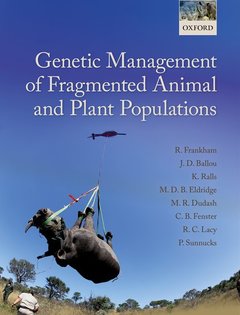Genetic Management of Fragmented Animal and Plant Populations
Langue : Anglais
Auteurs : Frankham Richard, Ballou Jonathan D., Ralls Katherine, Eldridge Mark, Dudash Michele R., Fenster Charles B., Lacy Robert C., Sunnucks Paul

One of the greatest unmet challenges in conservation biology is the genetic management of fragmented populations of threatened animal and plant species. More than a million small, isolated, population fragments of threatened species are likely suffering inbreeding depression and loss of evolutionary potential, resulting in elevated extinction risks. Although these effects can often be reversed by re-establishing gene flow between population fragments, managers very rarely do this. On the contrary, genetic methods are used mainly to document genetic differentiation among populations, with most studies concluding that genetically differentiated populations should be managed separately, thereby isolating them yet further and dooming many to eventual extinction! Many small population fragments are going extinct principally for genetic reasons. Although the rapidly advancing field of molecular genetics is continually providing new tools to measure the extent of population fragmentation and its genetic consequences, adequate guidance on how to use these data for effective conservation is still lacking. This accessible, authoritative text is aimed at senior undergraduate and graduate students interested in conservation biology, conservation genetics, and wildlife management. It will also be of particular relevance to conservation practitioners and natural resource managers, as well as a broader academic audience of conservation biologists and evolutionary ecologists.
Emeritus Professor Richard Frankham is one of the leading international figures in conservation genetics, having been a pioneering researcher in the discipline and senior author on the first textbooks in the field. In 2005 he was awarded a DSc by Macquarie University (Sydney, Australia), based upon his published work (now > 160 publications). Throughout his career he has worked on the genetic impacts of small population sizes in the contexts of conservation and evolutionary genetics and animal breeding. His background is in agriculture (BScAgr [Hons 1] and PhD from the University of Sydney, Australia). He worked for Agriculture Canada (1967-69), followed by a postdoctoral fellowship at the University of Chicago (1969-71), before spending 31 years at Macquarie University. He officially retired in 2002, but continues to work full-time. In 2004, he was Hrdy Visiting Professor in conservation biology at Harvard University, USA. Jonathan Ballou is a Research Scientist Emeritus at the Smithsonian Institution's Smithsonian Conservation Biology Institute in Washington, DC and from 2003-2006 was Head of its Department of Conservation Biology. His research has focused on the genetic and demographic problems confronted by small populations, especially of threatened species. He is recognized as a leader in developing the theoretical basis for the genetic management of small populations and in developing population management tools (software, applied theory) that are widely and internationally used by wildlife and zoo managers. Jon received his bachelor's degree in Animal Behavior from the University of Virginia in 1977, his masters in statistics at George Washington University in 1985 and his PhD in Population Genetics from the University of Maryland in 1995. Katherine Ralls is interested in the behavioral ecology and conservation genetics of mammals. She studied biology at Stanford and received her PhD from Harvard. An Emeritus Research Zoologist with the Smithsonian's Conser
Date de parution : 07-2017
Ouvrage de 432 p.
19.6x24.8 cm
Disponible chez l'éditeur (délai d'approvisionnement : 21 jours).
Prix indicatif 143,18 €
Ajouter au panierDate de parution : 07-2017
Ouvrage de 432 p.
19.5x24.7 cm
Thème de Genetic Management of Fragmented Animal and Plant... :
© 2024 LAVOISIER S.A.S.
